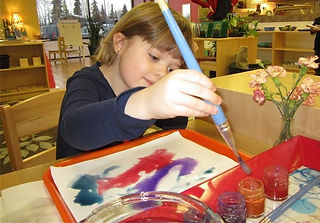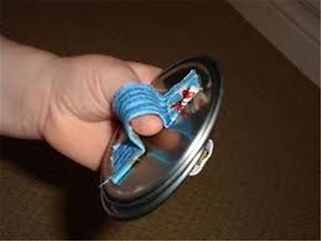

Willow Loft Preschool
Willow Loft Preschool
Where everyone learns and everyone teaches
About Us

Our mission statement, "where everyone learns and everyone teaches, is the very essence of our program. As adults we provide the child with an appropriate environment for learning and offer valuable insight and needed wisdom, but we offer these contributions at no greater value than what the child offers us in return. Both adult and child are equally influenced by each other, at WLP that relationship is honored and respected.
Our program is influenced by some of the best educators and educational theories in early childhood education. At WLP our program incorporates aspects of leading pedagogy: Montessori, Waldorf, and Reggio Emilia; all of whom made tremendous contributions towards the understanding of the young child’s education. The daily flow, classroom layout and work will strongly reflect a Montessori program. Children will be introduced to a new activity and then be allowed to choose when and what they do. Other influences come from Waldorf education, such as baking, beautiful art, imaginative play and rhythmic happenings. Reggio Emilia education offers a place for the child to facilitate the direction of their interest and an opportunity to record their ideas. And finally, our program represents our personal touch of originality, inspiration and resourcefulness!
Staff
Providing a high quality environment for a child requires trained, enthusiastic and adequate staff. Here at Willow Loft you will find all of those characteristics and more. Our teachers are college educated and have many years of experience working with young children both in and out of the classroom setting. Our teachers are required to pass an extensive background/fingerprint check and complete first aid and CPR courses as required. There are 2 fulltime lead teachers assigned to each class and 1 assistant teacher, which exceeds our licensing requirements.
Our Classroom
Great teachers help learners get to the point where their minds and hearts are open. At Willow Loft we focus on the child as an individual keeping in mind they are part of a community. We encourage children to ask questions, think for themselves, investigate, and ponder; to promote their ideas and interests as the child helps navigate the direction our studies take. Our objective is to help children feel safe and comfortable so that they may learn independently and retain the curiosity and intelligence with which they were born.
A primary goal of the program is to prepare and maintain the physical, intellectual, and social/emotional environments in which the children work. A key aspect of this is the selection of intriguing and developmentally appropriate learning activities to meet the needs and interests of every child.
Our program focuses heavily on the child’s social and emotional development using varying techniques and grace and courtesy lessons. Being in control of one’s self allows for deeper friendships and less conflict and unhappiness in the child’s day. We believe that a child who can control their body and emotions well can progress easily in other tasks and interests they may have.

Practical Life
Practical life exercises help the child adapt to their environment and care for themselves, thus enabling the child to develop independence. Examples of these exercises include tasks such as baking, buttoning, plant care, pouring, scooping, carrying and cleaning.

Geography & Culture
The objective of this area is to help the child become aware of and appreciate the history, cultures and world around them.

Sensorial
Children learn about the world by actively using all their senses. Sensorial and manipulative activities such as puzzles, matching games, sensory bin activities and sound cylinders are used. These exercises assist the child in the process of classification of his or her environment through comparing and contrasting, which then helps in developing order and clarity of thinking.

Language
Language exercises develop the child's ability to communicate through spoken language, symbols, relationships, and self-written work. Reading, listening to stories, talking and writing are all part of language development. Children are encouraged to communicate through group discussion, poem memorization, dramatic play, drawing and writing.

Mathematics
When a child is ready, he or she is introduced to simple math activities. They explore ways in which quantities are related to one another and the association of quantities to numerals. The work progresses from general to specific using concrete materials.

Science
Science activities allow the child to explore, to question, find explanations, and to perform simple experiments.

Art
Art is an integral part of the program. Clay, crayons, watercolors and paper crafts are regularly available to children- and they are encouraged to use them. In addition, your child will have the opportunity to participate in regular painting lessons where direct instruction is used.

Music
Music occurs in a group and involves singing, rhythm and movement activities. Additionally, for variety and inspiration we have guest musicians that frequent our classrooms.

Cooking
Cooking projects support our classrooms’ monthly theme or cultural celebrations.

Physical Activity
Children have daily opportunities to engage in outdoor physical activities on the playground.